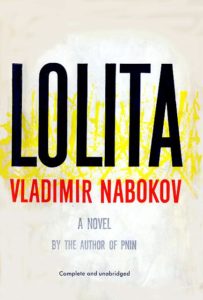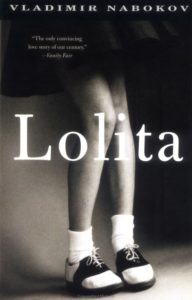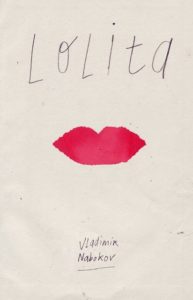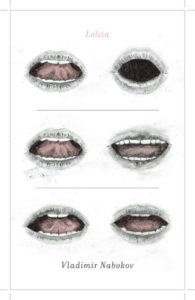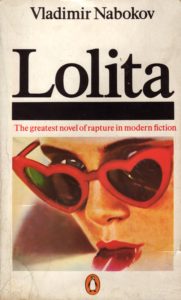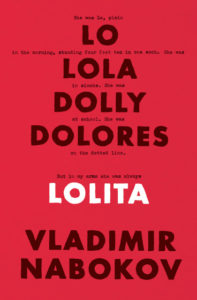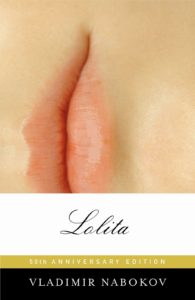Today marks the 62nd anniversary of the American publication of Vladimir Nabokov’s most controversial and iconic work. Lolita—the story of a verbose, middle-aged literature professor, sexually obsessed with pre-pubescent girls, and his perverse and destructive relationship with 12-year-old Dolores Haze—became a near-instant bestseller in the US, shifting over 100,000 copies in its first three weeks alone. A damning review from Orville Prescott in the New York Times (in which he famously called the novel “dull, dull, dull in a pretentious, florid and archly fatuous fashion”) failed to dampen the public’s enthusiasm. The shocking subject matter, gleefully punning unreliable narrator, and Nabokov’s spellbinding sentence-level prowess combined to create a book as repulsive as it was inviting—comic and horrific and utterly absorbing.
Lolita‘s place in the pantheon has been secure for decades now, but as you’ll see below, upon its initial release, some, like Prescott, were less than captivated by the monstrous machinations of Humbert Humbert. Writing in the Spectator, Lucky Jim author and angry young man of mid-century British letters Kingsley Amis called it “bad as a work of art, and morally bad…a Charles Atlas muscle-man of language as opposed to the healthy and useful adult.”
For the most part, though, American critics saw the novel for what it was: a masterpiece.
*
“The first time I read Lolita I thought it was one of the funniest books I’d ever come on. (This was the abbreviated version published in the Anchor Review last year.) The second time I read it, uncut, I thought it was one of the saddest. I mention this personal reaction only because Lolita is one of those occasional books which arrive swishing behind them a long tail of opinion and reputation which can knock the unwary reader off his feet. Is it shocking, is it pornographic, is it immoral? Is its reading to be undertaken not as a simple experience but as a conscious action which will place one on this, or that, side of a critical dividing line? What does the Watch and Ward Society say of it? What does Sartre, Graham Greene or Partisan Review?
This is hard on any book. Lolita stands up to it wonderfully well, though even its author has felt it necessary to contribute an epilogue on his intentions
…
“I can only say that Humbert’s fate seems to me classically tragic, a most perfectly realized expression of the moral truth that Shakespeare summed up in the sonnet that begins, ‘The expense of spirit in a waste of shame/ Is lust in action’: right down to the detailed working out of Shakespeare’s adjectives, ‘perjur’d, murderous, bloody, full of blame.’ Humbert is the hero with the tragic flaw. Humbert is every man who is driven by desire, wanting his Lolita so badly that it never occurs to him to consider her as a human being, or as anything but a dream-figment made flesh 3/4 which is the eternal and universal nature of passion.
The author, that is, is writing about all lust. He has afflicted poor Humbert with a special and taboo variety for a couple of contradictory reasons. In the first place, its illicit nature will both shock the reader into paying attention and prevent sentimentally false sympathy from distorting his judgment. Contrariwise, I believe, Mr. Nabokov is slyly exploiting the American emphasis on the attraction of youth and the importance devoted to the ‘teen-ager’ in order to promote an unconscious identification with Humbert’s agonies. Both techniques are entirely valid. But neither, I hope, will obscure the purpose of the device: namely, to underline the essential, inefficient, painstaking and pain-giving selfishness of all passion, all greed—of all urges, whatever they may be, that insist on being satisfied without regard to the effect their satisfaction has upon the outside world. Humbert is all of us.
…
“This is still one of the funniest and one of the saddest books that will be published this year. As for its pornographic content, I can think of few volumes more likely to quench the flames of lust than this exact and immediate description of its consequences.”
–Elizabeth Janeway, The New York Times, August 17, 1958
“Lolita is a major work of fiction; it is also a shocking book. Prefaced by a fictitious academic fathead who presents it as a message to ‘parents, social workers, [and] educators,’ the book describes the transcontinental debauch of a twelve-year-old girl by a middle-aged monomaniac. As it turns out, the narrator is writing his apologia from a prison cell (he is to be tried for murder). As far as erotic detail is concerned, the book tells little that has not been dealt with in a lot of bestselling fiction; but where the sexy bestsellers talk about the sordid or tragic facts of life in staccato sociology, couch jargon or four-letter words, Lolita is the more shocking because it is both intensely lyrical and wildly funny. It is (in many of its pages) a Medusa’s head with trick paper snakes, and its punning comedy as well as its dark poetics will disappoint the smut hounds—a solemn breed.”
“Word-of-mouth reports hinted that Lolita was hot stuff and the implication was that the book was a high-class Peyton Place. Nothing could be farther from the actual fact. Lolita is not a lewd book and if it arouses any prurient interest in anybody, I will be very much surprised. Those who are seeing thrills would be well advised to go elsewhere to those novels which have no other purpose than the collection of sexual scenes bathed in cliched lust.
What you will find in Lolita are other pleasures and other sadnesses. If you like Fielding, Smollett and Sterne, if the comic novel of the 18th century appeals to you, you are in for a treat. Lolita is a small masterpiece, an almost perfect comic novel, a rare thing in these days when we have lost sight of the purgative and pleasurable effects of comedy and when tragedy has become the small and poverty-stricken province of southern effetes and New England housewives.”
…
“Whether intended or not, it is a savage satire on the inadequacy of ‘psychological realism.’ There is no lack of insight in Lolita but it is enhanced by its relationship to all else in the world and by implication, the cosmos.”
–Robert R. Kirsch, The Los Angeles Times, August 31, 1958
“Few books published in this country since the King James Bible can have set up more eager expectation than Lolita, nor, on the other hand, can any work have been much better known in advance to its potential audience … It is encouraging to see all this concern for a book of serious literary pretension, even if some of the concern, while serious enough, is not literary in the way we ordinarily think of it. One would be even more encouraged if the book in question were not so thoroughly bad in both senses: bad as a work of art, that is, and morally bad—though certainly not obscene or pornographic.
…
“No extract, however, could do justice to the sustained din of pun, allusion, neologism, alliteration, cynghanedd, apostrophe, parenthesis, rhetorical question, French, Latin, anent, perchance, would fain, for the nonce—here is style and no mistake. One will be told, of course, that this is the ‘whole point,’ that this is the hero, Humbert Humbert, talking in his own person, not the author, and that what we are getting is ‘characterisation.’ All right; but it seems ill-advised to characterise logomania by making it talk 120,000 words at us, and a glance at Nabokov’s last novel, Pnin, which is not written in the first person, establishes that this is Nabokov talking … The end product sadly invokes a Charles Atlas muscle-man of language as opposed to the healthy and useful adult.
…
“There comes a point where the atrophy of moral sense, evident throughout this book, finally leads to dullness, fatuity and unreality … The only success of the book is in the portrait of Lolita herself. I have rarely seen the external ambience of a character so marvellously realized.”
–Kingsley Amis, The Spectator, November 6, 1959
“What makes the book ‘flame,’ I think, is first of all a love affair with the real America. (‘Nothing is more exhilarating than philistine vulgarity. … I chose American motels instead of Swiss hotels or English inns only because I am trying to be an American writer and claim only the same rights that other American writers enjoy.’) It is an America where language and event make a seamless web of wonders, terrors, revelations and portents. English, for Mr. Nabokov, is an instrument for the wildest and most mysteriously fitting shifts of tone, the most cheerfully extraverted, slang-relishing, literate verbal tomfoolery.
…
“Since the Anchor Lolita is purged of its fleshier parts, since the author defends himself very ably, and since to dwell on the book’s more lurid side is to connive with witlessness, I shall skip all this. Suffice it here to say that Lolita’s chief actor, Humbert Humbert, a Swiss ‘salad of racial genes,’ is afflicted with about equal degrees of wit, ennui, taste and a hideously overt form of nympholepsy; the disease of Ruskin and Lewis Carroll given free and tender rein in a wilderness of American motels, suburbs and progressive institutions. Lolita is a burlesque of Freudianism that Freud would have had to enjoy. I can respect Fred Dupee’s view, in his Anchor Preface to the book, that ‘there is frequently a disquieting note of unresolved tension’; but am inclined to think that the burlesque takes one more turn, at least, than we would expect of any previous example of the ‘confessional novel’ or ‘roman noir’ (Mr. Dupee’s terms). All Mr. Nabokov has to confess, I think, is imagination enough to project the charms of a Phedre or Cleopatra into the skin of an odious suburban bobby-soxer. How perverse this is each reader must decide for himself; but few milder absurdities would have suited Mr. Nabokov’s mad purposes so well.”
–R.W. Flint, The New Republic, June 1, 1957
“The novel’s scandal-tinted history and its subject—the affair between a middle-aged sexual pervert and a twelve-year-old girl—inevitably conjure up expectations of pornography. But there is not a single obscene term in Lolita, and aficionados of erotica are likely to find it a dud. Lolita blazes, however, with a perversity of a most original kind. For Mr. Nabokov has distilled from his shocking material hundred-proof intellectual farce. His book is slightly reminiscent of Thomas Mann’s Confessions of Felix Krull; but Lolita has a stronger charge of comic genius and is more brilliantly written. Mr. Nabokov, a Russian émigré now working in his second tongue, has few living equals as a virtuoso in the handling of the English language.
…
“Wild, fantastic, wonderfully imaginative, it is a style which parodies everything it touches. It surely justifies, at least in part, those critics who have seen in Lolita a satire of the romantic novel, of ‘Old Europe’ in contact with ‘Young America,’ or of ‘chronic American adolescence and shabby materialism.’ But above all Lolita seems to me an assertion of the power of the comic spirit to wrest delight and truth from the most outlandish materials. It is one of the funniest serious novels I have ever read; and the vision of its abominable hero, who never deludes or excuses himself, brings into grotesque relief the cant, the vulgarity, and the hypocritical conventions that pervade the human comedy.”
–Charles J. Rolo, The Atlantic, September 1958 Issue
“Certain books achieve a sort of underground reputation before they are published. Gossip arouses expectations that they are even nastier than the last succès de scandale. College students returning from visits to Paris demonstrate their newly acquired sophistication by brandishing paperbound copies. College professors write solemn critical analyses in scholarly publications. And if their authors are really lucky some act of official censorship publicizes their work to the masses. Lolita by Vladimir Nabokov is such a book. Mr. Nabokov is particularly lucky because his book was not censored in the United States, but in France of all places. What more could he hope for? The French ban was eventually removed and now this book written in English in the United States by a White Russian emigré can be bought legally in Paris where it was first published. Its American publication today has been preceded by a fanfare of publicity. Prof. Harry Levin of Harvard says it is a great book and darkly symbolical (Mr. Nabokov explicitly denies any symbolism). Graham Greene says that Lolita is a distinguished novel. William Styron says it is ‘uniquely droll’ and ‘genuinely funny.’
Lolita, then, is undeniably news in the world of books. Unfortunately, it is bad news. There are two equally serious reasons why it isn’t worth any adult reader’s attention. The first is that it is dull, dull, dull in a pretentious, florid and archly fatuous fashion. The second is that it is repulsive.
Lolita is not crudely crammed with Anglo-Saxon nouns and verbs and explicitly described scenes of sexual violence. Its depravity is more refined. Mr. Nabokov, whose English vocabulary would astound the editors of the Oxford Dictionary, does not write cheap pornography. He writes highbrow pornography. Perhaps that is not his intention. Perhaps he thinks of his book as a satirical comedy and as an exploration of abnormal psychology. Nevertheless, Lolita is disgusting.
…
“A great writer, a genius like Shakespeare, can write superbly of King Lear; but Shakespeare surrounded Lear by other interesting characters and did not write exclusively from within Lear’s ruined mind. The writer’s subject is human conduct and the motives that inspire it. A madman has no motives, only forces he responds to. His ravaged brain belongs to the psychiatrists and psychoanalysts, not to novelists.
Past the artistic danger line of madness is another even more fatal. It is where the particular mania is a perversion like Humbert’s. To describe such a perversion with the pervert’s enthusiasm without being disgusting is impossible. If Mr. Nabokov tried to do so he failed.”
–Orville Prescott, The New York Times, August 11, 1958
“With scarifying wit and masterly descriptive power, he excoriates the materialist monstrosities of our civilization—from progressive education to motel architecture, and back again through the middle-brow culture racket to the incredible vulgarity and moral nihilism in which our children of all classes are raised, and on to psychoanalysis and the literary scene. He stamps indelibly on every page of his book the revulsion and disgust with which he is inspired, by loathsomely dwelling upon a loathsome plot: a detailed unfolding of the long-continued captivity and sexual abuse of a 12-year-old girl. To drive home the macabre grotesquerie of what he sees about him, he climaxes the novel with a murder that is at the same time horrible and ridiculous, poised between Grand Guignol and Punch & Judy.
…
“…satire, I am sure, considering his ability and the quality of what he has written, was Mr. Nabokov’s intention. Of course I may be wrong. He may simply be an immensely gifted writer with a perverted and salacious mind. But if the latter is true, it does not change the situation much. Lolita, in the context of the reception it has been given, remains nevertheless a savage indictment of an age that can see itself epitomized in such horror and run to fawn upon the horror as beauty, delicacy, understanding. But I hope that this is not so, that Mr. Nabokov knew what he was doing. It is so much more exhilarating to the spirit if the evil that human beings have created is castigated by the conscious vigor of a human being, not by the mere accident of the mirror, the momentary unpurposeful reflection of evil back upon evil.”
–Frank S. Meyer, National Review, November 22, 1958
“Three hundred pages of sex in the head. A good number of them funny pages, I admit. Even delicately Joycean. But too many, and too much.”
-Jerry Talmer, The Village Voice, September 3, 1958
Lolita at 30:
” ‘Lolita is famous, not I,’ Nabokov said to one of the many interviewers who came to interrogate him after the succes de scandale of Lolita. And like so many Nabokovian utterances, it was both true and the mirror image of true. Lolita’s fame made her creator both a ‘brand-name’ author—to use that distressing contemporary locution—and an adjective … As one whose literary debut was also steeped in scandal, I know intimately the ambivalent feelings of an author who gains wide fame and commercial acceptance through a misunderstanding of motives. Much as one wants the acceptance conferred by best-sellerdom, it is bittersweet to win this by being thought a pervert. This alone explains Nabokov’s half-mocking reference to Lolita‘s fame. Nabokov knew that he had been toiling in the vineyards of the muse since adolescence. The public did not. Nabokov knew that he had translated Alice in Wonderland into Russian, the public did not. With 11 extraordinary novels, a study of Gogol, an autobiography, numerous short stories, poems and translations behind him, the author of Lolita was hardly a literary novice. His identity as a novelist, poet and literary scholar had been honed and polished in three languages since he privately printed his poems in St. Petersburg at the age of 15, and he had endured more traumas than sudden fame. The generous, amused, self-mocking way he reacted to Lolita‘s stardom contains within it all the paradoxes of a career rich in paradoxes, a career that seems to have the very symmetry, balance and irony of his novels themselves.
It is almost superfluous to introduce Lolita—even on her 30th birthday—because Nabokov, who thought an author should control the world in his book with godlike authority, anticipated all the possible front (and rear) matter any reader could wish.
…
“The obsession of Humbert with ‘Lolita’ has been compared to many things: the obsession of the artist with the creative process, the butterfly collector with his specimen, the exile with retrieving a lost homeland (a characteristic Nabokovian theme). It is all these things, and more. And yet the book works, above all, because it is so clearly the story of a man maddened by an impossible love, the impossible love for an impossible object: a banal little girl who calls him ‘kiddo.’ Are not all impossible, obsessional loves inexplicable to other people? Do our friends ever understand what we see in them? Isn’t that inexplicability the wonder and the terror of obsessional loves?
…
“The great thing about masterpieces is that they seem always to have existed, unopposed. Outrageous, inevitable, infinitely rereadable, Lolita at 30 is as young as she was as a glimmer in her author’s eye. She has, in fact, defeated time—her enemy, her inspiration.”
–Erica Jong, The New York Times, June 5, 1988
Lolita at 50:
“Lolita turns 50 this year, and having stayed so perverse, it remains fresh as ever. To fully appreciate its perversity, though, one must first appreciate that it is not obscene. Your run-of-the-mill obscene masterwork—Tropic of Cancer, say—demands that you, enlightened reader, work your way past the sex and excrement to recognize how beautiful it is. But with Lolita, you must work past its beauty to recognize how shocking it is. And for all its beauty, for all its immense ingenuity and humor, one easily forgets how shocking Lolita is.
…
“Lolita is most commonly remembered as one man’s living poem to his own daemonic perversity, and as such, is overpraised by its adherents for its technical virtuosity and hilarity, and misconstrued by its detractors as little more than a frost-encrusted monument to Nabokov’s own monumental arrogance. Its real genius is too easily missed. It lies in what Nabokov called the ‘nerves of the novel,’ the ‘secret points, the subliminal coordinates by means of which the book is plotted.’ In these, Nabokov has hinted at the life that exceeds the perimeter of Humbert’s encompassing obsession—at the inner lives of those others whom he so casually dismisses or destroys. It cost Nabokov, by his own admission, ‘a month of work’ to write one sentence in which Humbert gets his hair cut by a barber who has never stopped mourning his dead son—a fact that scarcely dents Humbert’s exquisite consciousness.”
–Stephen Metcalf, Slate, December 19, 2005

